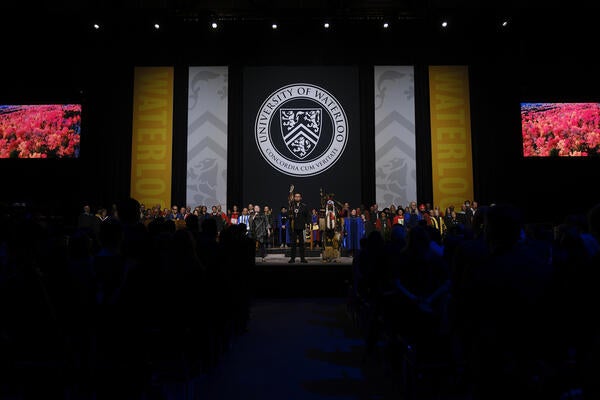
Faculty of Mathematics professors named University Research Chairs
Chaitanya Swamy and William Slofstra among this year’s winners of Waterloo designation for research excellence

Chaitanya Swamy and William Slofstra among this year’s winners of Waterloo designation for research excellence
By Jon Parsons Faculty of MathematicsTwo researchers from the Faculty of Mathematics have been awarded University Research Chairs.
Awarded by the Office of the Provost, a University Research Chair recognizes exceptional achievement and pre-eminence in a particular field of knowledge.

Chaitanya Swamy
Professor, Department of Combinatorics and Optimization
Chaitanya Swamy is a researcher in the Department of Combinatorics and Optimization.
Swamy’s research focuses on algorithms for discrete optimization problems, looking especially at uncertainty and classes of problems that are not so well understood.
The techniques he develops find applications in various areas, including logistics, transportation, computer science, and ultimately with industry practices, where his research can be adapted to address resource constraints through optimization.
Swamy says his goal is always to find techniques that work across a set of problems.
“I am deeply honoured to have received a University Research Chair,” he says. “My colleagues and my department chair have supported me in so many ways and I want to express my gratitude. The Department of Combinatorics and Optimization has a unique environment that fosters innovation. It’s really an amazing team.”
Swamy says the new appointment will allow him to devote more time to research and also to grow his research team.
“I have the privilege of working with amazing graduate students and postdoctoral researchers,” he continues. “This research chair will be a boost for bringing in even more high-quality personnel. I benefited immensely from my supervisors and mentors, and I’m grateful to be able to pay it forward.”

William Slofstra
Assistant Professor, Department of Pure Mathematics
William Slofstra, an assistant professor in the Department of Pure Mathematics and a faculty member with the Institute for Quantum Computing, works in the field of mathematics of quantum information and computation.
Slofstra’s work sets out to understand the limits of solvable and unsolvable problems relevant to quantum computing, helping to bridge the theoretical and practical gap between quantum mechanics and computer science.
“I’m extremely grateful for this honour and for being given the opportunity to develop my research program,” he says. “Time is the one thing that is always in short supply for a researcher like me, with so many commitments alongside the research. The university research chair takes some of the pressure off and will be a big boost for my work.”
Slofstra also credits his colleagues in the Department of Pure Math with enabling him to have the freedom to explore interesting problems and build research partnerships across disciplines.
“It’s a testament to the collaborative and collegial mentality of the department to be so supported by David McKinnon, my department chair, and by so many of the other researchers,” he continues.
“Here at Waterloo, there are so many opportunities to connect with other fields, and it’s supported top to bottom in my department.”

Read more
Here are the people and events behind some of this year’s most compelling Waterloo stories

Read more
Meet five exceptional Waterloo graduate students crossing the convocation stage as Class of 2025 valedictorians

Read more
Waterloo is proud to award honorary doctorates for significant contributions in mathematics and public service
The University of Waterloo acknowledges that much of our work takes place on the traditional territory of the Neutral, Anishinaabeg, and Haudenosaunee peoples. Our main campus is situated on the Haldimand Tract, the land granted to the Six Nations that includes six miles on each side of the Grand River. Our active work toward reconciliation takes place across our campuses through research, learning, teaching, and community building, and is co-ordinated within the Office of Indigenous Relations.